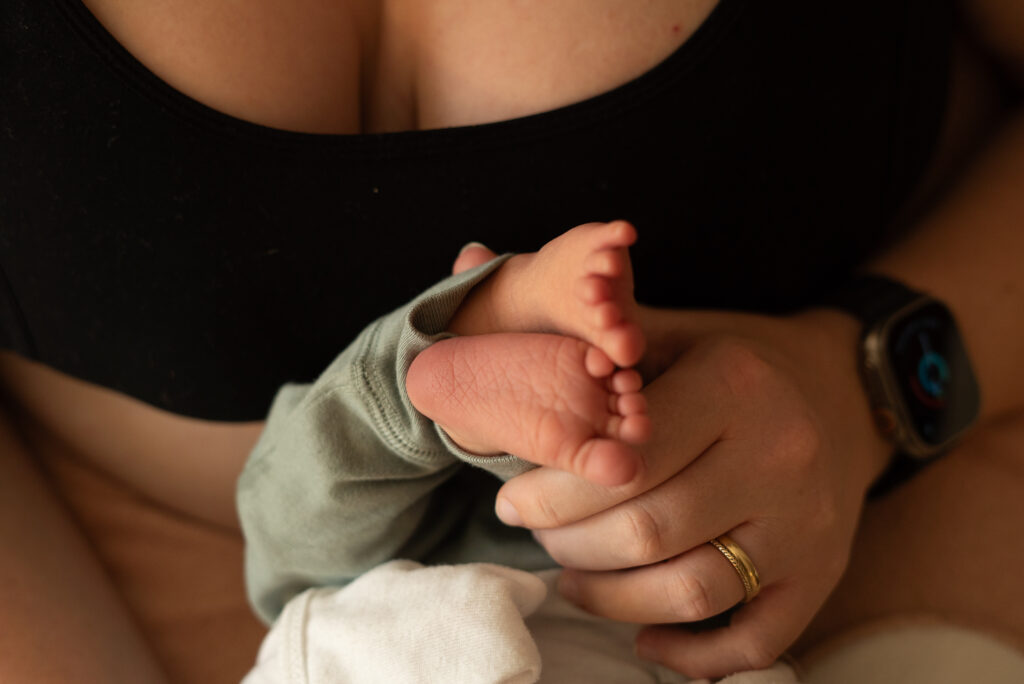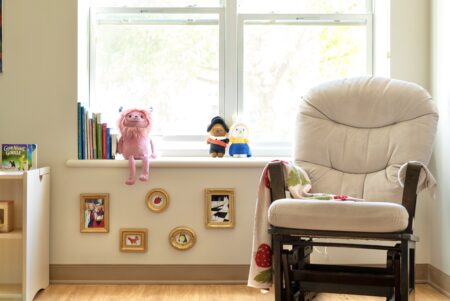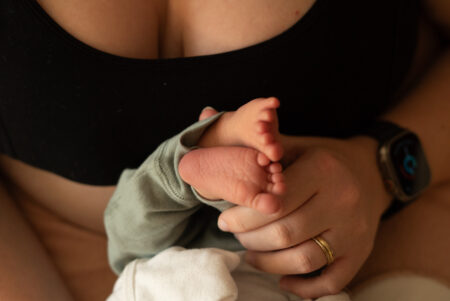The first weeks after we brought my daughter home from the hospital passed in a hazy, golden blur. I’m sure we did things, but I couldn’t tell you a single one—in my head it’s just one yawning stretch of time. She had some jaundice in the first few days, so my core memory is sitting with her in the armchair in front of our window, cradling her while she dozed happily in the sun. In my mind’s eye, I spent weeks in that chair, basking in a moment that stretched to eternity.
When she was about eight weeks old, we brought her to my parents’ house to meet a long-time family friend.
“How is it being parents?” he asked me.
“You know, this is crazy, but it’s honestly a lot easier than I thought.”
He looked bewildered, then laughed uncomfortably. “I’ve… never heard someone say that before.”
I hadn’t, either, but it was true. That’s not to say it wasn’t hard; our baby woke every two hours in the night just like every other newborn, and, just like all other parents, we had one panicked evening where we couldn’t figure out what was making her wail like that. (The answer: gas.) But I’d heard such horror stories from friends that I was preparing myself for the hardest and most brutal time of my life. A good friend of mine is a doula, and she’d told me many times before I gave birth that “having a baby is like having a bomb go off in your marriage.” In comparison to that, our sleep-deprived early months felt like bliss to me.
I’m seven months in now, and I will say that that in hindsight, I can recongize that I was running off a lot of adrenaline in those early months. The train eventually caught up with me; sleep regressions, teething, and newfound object permanence make tired hags of us all. Just a few days ago, I reached my wit’s end after a day in which my daughter cried every time I left the room, even just for five seconds to put on deodorant. Ken asked once he finished work, “What do you need?” I said, “Just ONE HOUR of silence where no one is touching me,” and then went to go read outside on a bench.

There are many privileges that have made my transition to motherhood relatively smooth—a supportive partner, an equitable distribution of household labor, and a proverbial village, to name just a few. But there’s one unexpected gift that has made this transition easier than I’d thought, and that is the years before pregnancy that I spent struggling with infertility and loss.
Motherhood brings you face to face with your own shadow. It forces you to confront the feelings and behaviors you find acceptable; it puts to the test the person you thought you’d be. I’ve seen friends walk through the early months of motherhood carrying sharp, jagged questions of identity, belonging, and the future. Those questions came for me, too—but they came softly, worn and rounded like seaglass. They were smooth to the touch after years of being carried in my pocket; turned over and over in my palm in doctor’s offices; when finding fresh blood when I should have been pregnant; weeping in churches over babies I would never meet.
Infertility is motherhood’s unwanted step-sister, and she takes us on much the same journey. Like all hero’s journeys, this one starts with a call to an unknown world. The same call, actually: let’s have a baby. But where motherhood first takes us through the unknowns of pregnancy—a rapidly changing body; the struggle of identity now that you are both a person and a host—infertility takes you to an unknown that is immediately far more existential.
What’s wrong with me? Will I ever be a mother? If not, what does that mean? Who am I without the thing I want most in the world?
These existential questions come for mothers, too. But in the case of healthy, easy pregnancies, they’re often delayed as we get pulled into the world of preparing for birth and a baby. And so, for those of us who do eventually reach motherhood after already descending through the underworld of infertility and pregnancy loss, the underworld of motherhood feels a little less dark.
What’s wrong with me? Will I ever feel like myself again? Who am I as a mom?
Ah—I’ve met these questions before, in different clothes. They are still to be reckoned with. But I’m experienced in reckoning by now.
I’ve been hesitant to express this, even to myself. For years, I decried “silver linings theology” that told me that this would all be worth it one day; that this suffering would make me a stronger and better person. “I would have been a perfectly good person without all this trauma,” I once told a friend, sitting on a bench by the water. “Maybe a bit more boring, but at least I’d be happy.”
I owe a great debt to that version of myself. It’s her tenacity—her staunch determination in the face of fear—that brought me here. Without her willingness to risk another loss, I wouldn’t have had my daughter. It’s that loyalty that makes this hard: I can’t and won’t ever sell her out for a cheap theological message that implies that maybe all of this was part of some brilliant master plan. After all, there are women for whom the hoped-for child never comes. What of their suffering and loss?
And yet, I can honor the version of me who has grieved, and also honor the grief and the lessons it gave me. Grief is a gentle teacher. She is an age-old friend, one who’s known you for decades. One you’d rather avoid, because she’s seen you in some of your worst, and most shameful, moments. She shows up on your doorstep in the middle of the night after your life has suddenly fallen apart.
“I’m sorry I never called,” you say.
“Don’t worry about it.” Grief pulls you into her arms—too close for comfort and somehow nice all the same. “Here. We’ll do the dishes together.”
Grief was a companion to me for years before I had my daughter. She sat with me and held my hand when I feared I’d lose this baby, too. She didn’t know how that pregnancy would end, but she told me I’d survive if it did—and somehow, that was a comfort.
And now, here I am: raising a doughy ball of laughter and joy—of warmth and light and need. Grief still sits with me, even in these moments. I’ve learned to let her be. I look at my daughter’s perfect sleeping face, and wonder what kind of world she’ll grow up in; how I’ll one day explain to her that the oceans are growing acidic, and we didn’t used to have fire every summer.
I think those things and feel an ache in my chest, and Grief wraps her arms around me and says: it’s okay. This hurts because you love.
And somehow the simple truth of that, too, is a balm.





